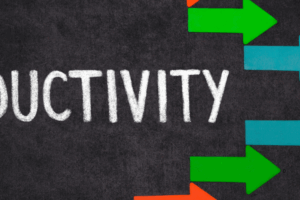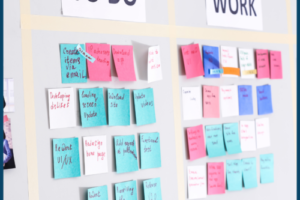
4 Crucial Tactics for Ending Procrastination
PROCRASTINATION. A skill many of us have but don’t want. Sometimes procrastination “feels good.” Maybe we are doing something really fun and enjoyable. Sometimes procrastination is a real drag; we feel guilty about what we “aren’t getting done.”
“Procrastination is like a credit card: it’s a lot of fun until you get the bill.” ~ Christopher Parker
On one hand, I agree: you’re buying an item that you want just like you’re using time the way you prefer. On the other hand, unless you pay off the whole credit card balance, you’re living on borrowed money for which you have to pay interest. With procrastination, you’re living on borrowed time which has to be taken from a different task at another time. You often pay with stress, frustration or other consequences.
Personal example: years ago I had some shoulder pain and went to the orthopedist. He recommended a cortisone shot along with physical therapy (PT). After several months of physical therapy, my range of motion had gotten better, yet the pain was about the same.
Stay with me, I promise this applies!
The doctor had originally said that there are two locations for a shot with my type of shoulder pain. Furthermore, if the shot along with PT didn’t solve the issue, I could return and he’d give me a shot in the second location. Well, since I have reactions to cortisone shots, I dutifully continued PT but procrastinated making another doctor’s appointment.
When I finally relented, it turned out that I didn’t need the second shot because my rotator cuff was torn and I’d need surgery. This meant that I wasted lots of time and money going to PT when it wasn’t going to solve the problem! It’s an understatement to say that I was frustrated with myself!
So what do we do about procrastination?
Since procrastination is a skill we’ve learned, it’s a skill we can unlearn, per se. Here are four tactics to counteract procrastination:
#1 The Obstacle of the Unknown. This shows up when you know what needs to be done but you are missing information. It might be details that someone else hasn’t given you yet. It could be information you do not know. The bottom-line is that you don’t have all the facts you need to complete the task.
You neutralize this obstacle with knowledge. If you are waiting for data from someone, ask them to give it to you by a specific date. If you don’t know something, do some research: ask someone, get on the web, or go to the library.
This is what I could have done. After a month or two without any pain relief, I should have gone back to the doctor. Even if he had recommended another cortisone shot, I could have asked for other options. Or I could have done additional research on the web.
The Obstacle of the Unknown is usually the easiest and most defined task completion hindrance factor to resolve. Gather knowledge instead of procrastinating.
#2 Lack of Clarity. This surfaces when you’re unclear of the expectations and/or desired end result of the project. When you were assigned (by you or from someone else) the task, you might have thought you completely understood. Now, a few days later, you aren’t so sure. Maybe the scope of the project has changed and you’re not sure how that affects your deliverable. Possibly other people on the project have conflicting information.
The reason for the ambiguity is really not relevant. You offset this deficit by clarifying the expected end result. Usually this involves connecting with others. You have many tools of communication, so choose the one that works for you, the people you are contacting, and the activity you are discussing. Email, text, or instant messaging works great if you’re asking simple questions with short answers. A phone conversation, in-person meeting, or Zoom call is more appropriate if the situation is complex and/or relies on lots of visuals.
The Lack of Clarity solution can overlap The Obstacle of the Unknown remedy, so make sure to distinguish between these two so you can use the best method to stop procrastinating.

#3 All-or-nothing. This pops in when you believe you have to finish the whole project “in one sitting.” Procrastination happens because you never feel like you have an adequate length of time to complete the endeavor all at once.
The key is division. The undertaking needs to be divided into bite-size tasks.
This can be a challenge for several reasons. First, it’s not always easy to “see” logical smaller pieces of the job. Everything seems large and like it will take a long time. Second, some people have brains that struggle to understand how to divide a bigger job into smaller parts.
There are several methods that help with division:
- Writing or drawing the different activities. It can be done on cards or sticky notes so they can be moved into the best order.
- Talking it out with someone. This can be a friend, family member, colleague, or coach.
- Work on one step that has a definitive beginning and end.
#4 The Illusion of Perfectionism. This emerges when you delay starting a task because you think you can’t do it perfectly. There are a number of reasons you might feel this way: not enough time, very high standards, fear of failure, etc.
The biggest problem with perfectionism is: who defines it? You probably have one idea of the perfect end product. Yet if you asked three people, they might each give a different answer.
One strategy to minimize this illusion is to decide the importance of the project. If you’re creating a pitch for a big account, an excellent and thorough job is required. On the other hand, if you need to create a draft of an internal document, “good enough” may fit the situation. You’re just the starting point, others will add their thoughts and comments.
Similarly, labeling utilitarian containers inside the pantry needs to be functional, not necessarily decorator level. However, a living room, used by multiple people including visitors, may be a little different. You may want higher quality bins and nicer labels.
The Illusion of Perfection requires intentional effort to overcome. It may be helpful to work with a qualified counselor or coach.
The All-or-Nothing challenge can compound the difficulties of the Illusion of Perfection. It can be helpful to define which one has the most impact and disarm it first.
If I made developing the strategies to counteract procrastination sound easy to do, they are not. I wish I could say otherwise, but that would be a lie. You must be intentional to journey from consistently procrastinating to rarely procrastinating.
I know I gave you lots of information, but don’t let it overwhelm you and cause you to procrastinate more. ?
Start small by choosing one project and one way to minimize the procrastination. The sooner you implement one of these strategies, the faster you’ll put your procrastination behind you.
Which strategy will you try next time you find yourself procrastinating? Type your strategy below, along with any questions or comments.



